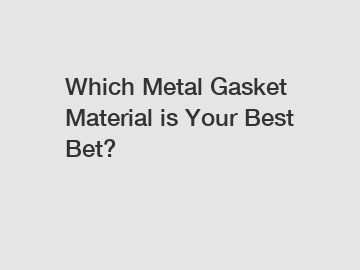Which Metal Gasket Material is Your Best Bet?
Which Metal Gasket Material is Your Best Bet?
Metal gaskets play a crucial role in various industries, ensuring effective sealing between two surfaces to prevent leakage and maintain the integrity of the system. The choice of gasket material is paramount to ensure optimal performance and longevity. With a multitude of options available, it can be daunting to determine which metal gasket material is your best bet. In this article, we will explore the most common types of metal gasket materials, their advantages and disadvantages, and help you make an informed decision.
1. Soft Iron Gaskets:

Soft iron gaskets are a popular choice due to their excellent malleability and high compressibility. These characteristics make them ideal for irregular or rough flanges, as they conform to surface imperfections, providing a reliable seal. However, soft iron gaskets are susceptible to corrosion, making them less suitable for applications involving chemicals or corrosive environments.
2. Copper Gaskets:
Copper gaskets are well-known for their exceptional thermal and electrical conductivity. They can handle high temperatures and are resistant to corrosion, making them suitable for a wide range of applications. Copper gaskets are commonly used in the automotive industry, where they seal exhaust systems and cylinder heads. However, copper is a soft material that can easily deform under high loads, necessitating careful installation to avoid leakage.
3. Aluminum Gaskets:
Aluminum gaskets offer excellent resistance to corrosion and high temperatures, making them a suitable choice for applications involving oils, fuels, and certain chemical compounds. They are lightweight and have good electrical conductivity, which is advantageous in industries such as electronics. However, aluminum gaskets are not recommended for applications where they may come into contact with acids or alkalis, as they can quickly deteriorate.
4. Stainless Steel Gaskets:
Stainless steel gaskets are highly durable and can withstand extreme temperatures, making them a versatile choice for various industries. They offer exceptional resistance to corrosion and can handle high-pressure applications. Stainless steel gaskets are commonly used in the oil and gas industry, petrochemical plants, and refineries. However, their versatility comes at a higher cost, which should be considered in the decision-making process.
5. Inconel Gaskets:
Inconel gaskets are predominantly used in applications where resistance to high temperatures and corrosive environments is crucial. These gaskets are composed of a nickel-chromium alloy that provides excellent strength and oxidation resistance. Inconel gaskets are commonly found in aerospace, marine, and chemical industries. However, their high cost and limited availability may be a deterrent for some applications.
In conclusion, choosing the best metal gasket material depends on several factors, including the specific application, temperature, pressure, and the surrounding environment. Soft iron gaskets are suitable for irregular surfaces but may not be ideal for corrosive environments. Copper gaskets offer excellent conductivity but require careful installation to prevent deformation. Aluminum gaskets are resistant to corrosion and high temperatures but may not be compatible with certain chemicals. Stainless steel gaskets are durable and versatile but come at a higher cost. Inconel gaskets are ideal for extreme conditions but may present challenges in terms of cost and availability.
Before making a final decision, it is essential to consult with industry experts and consider the specific requirements of your application. Additionally, factors such as budget, maintenance, and long-term reliability should also be taken into account. By carefully evaluating these different metal gasket materials, you can ensure that you make an informed decision and select the best material for your needs.
If you want to learn more, please visit our website sintered powder metal filters, Porous Titanium Tubes, sintered porous metal filters.


